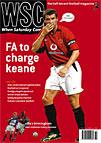 David Murphy looks at the problems facing Africa's most successful World Cup performer as it tries to build on the achievement of the national team
David Murphy looks at the problems facing Africa's most successful World Cup performer as it tries to build on the achievement of the national team
Beating their former colonial masters, France, on the way to the quarter-finals at their first World Cup produced a wave of public euphoria in Senegal that has still not fully died down. Football has a major ally in the country’s president Abdoulaye Wade, who was elected in March 2000, bringing an end to 40 years of Socialist party rule. A wily 76-year-old with a populist touch, Wade associates himself with the success of the team on every possible occasion, having made a big show of funding their trip to the World Cup and guaranteeing win bonuses.
Over the summer, footballers have been a regular presence in the presidential palace, especially El Hadji Diouf. Despite his playboy image, Diouf is, like most Senegalese, a practising Muslim – the title “El Hadji” indicating that he has undertaken the pilgrimage to Mecca – and both president and footballer belong to the Mourides, the country’s largest Islamic brotherhood. The day after Senegal’s victory over France, most newspapers carried a picture of El Hadji dancing joyfully during the post-match celebrations, wearing a T-shirt of a shrouded figure – none other than Cheikh Ahmadou Bamba, founder of the Mourides and not someone you’d often expect to see in the Sun.
Wade may want to project the national team as an example of “a Senegal that wins”, but so far their triumphs have merely papered over the cracks both in terms of politics and sport. Senegal remains a chronically poor society with an extremely weak sporting infrastructure and Wade does not have any spare cash to pump into the game. The national football league attracts tiny crowds – often in the hundreds – to crumbling stadiums with bumpy, grassless pitches. Even the leading clubs, such as Jeanne d’Arc, struggle to pay their players more than £50 a month (a modest amount even in Senegal). Below the first division, it is impossible to make a living from football.
Oumar Kane’s story says a lot about the state of Senegalese football. As a 20-year-old, he joined the then first division outfit Sodefitex. However, the club was relegated and Oumar drifted out of professional football because he could not earn enough from it to survive. Now 29, he lives three to a room in the Medina, a working-class area of Dakar, earning £5 a week by working 12 hours a day in a small shop-cum-bar on the coast road. A skilful player who still dances and glides his way around the stone-ridden, sandy surfaces that pass for pitches in Dakar, Oumar is disappointed but stoical about the fact that football could not provide him with a livelihood in Senegal: “There are no structures in this country. To succeed you need to go abroad.”
He is right about success lying abroad but some structures have begun to appear over the past ten years. Senegal is now dotted with “training centres” run by local coaches and former players, hoping to produce the next El Hadji Diouf for export to Europe. French clubs have been the main beneficiaries of this process, and Monaco have even established their own training centre, Aldo Gentina, in Dakar, which has already produced some talented professionals, including Tony Sylva and Salif Diao from the current national squad. The recent success of the national team has been based principally on the large number of players who have gained tactical nous at these training centres, which the fortunate few have then been able to develop at European clubs.
Many of those who don’t make the grade end up playing in the navetane (or rainy season, July to October) championships. Teams battle it out to be champion of their district; the winners go on to play at city, then regional and national level. Finals are held in major stadiums, often drawing crowds of 15,000-20,000, far above the attendance for most league matches. Each player in the national squad has a fan club in his own neighbourhood, whose members greet them every time they return home, and carry huge flags bearing the local hero’s name at international matches.
The World Cup gave a huge boost to football in Senegal, but the danger is that it will be a one-off success based on the emergence of a “golden generation”. The Senegalese FA president, El Hadji Malick Sy, is anxious to build on World Cup success, restructuring the national league and getting major companies involved in sponsorship so that the stadiums can be upgraded and playing surfaces improved. Maybe then the likes of Oumar Kane will finally be able to make a living in their own country. But it’s going to be a tough job to make it happen.
From WSC 188 October 2002. What was happening this month